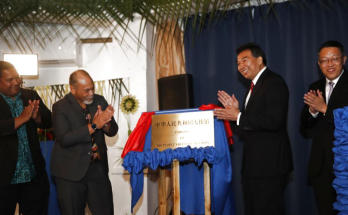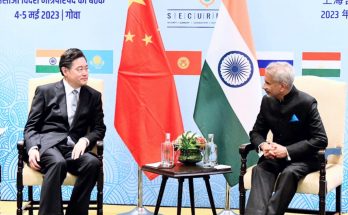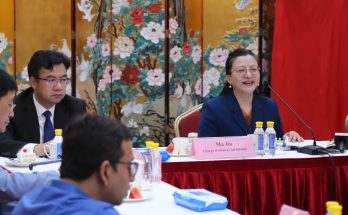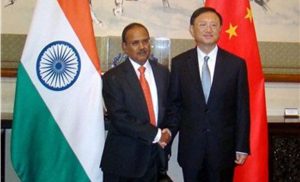
Ahead of National Security Adviser Ajit Doval’s visit to Beijing for a BRICS meeting, China has signalled a hardening of its posture on the continuing standoff along the Sikkim border by reiterating that the only way to resolve the impasse is for India to unconditionally withdraw troops as a precursor to any talks.
Alluding to remarks of China’s Foreign Minister Wang Yi, the spokesperson of China’s Foreign Office, Lu Kang, pinned the blame on India for trespassing into China’s territory and asked for an unconditional pull-out by India. “I have stressed many times that the crux of this incident is that the Indian border troops illegally trespassed into China’s territory and the solution as Wang put it is for Indian border troops to pull-out unconditionally. This is a precondition basis for any meaningful talks between the two countries,” said the spokesperson in Beijing on July 26.
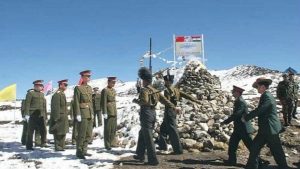 The Chinese spokesperson’s clarification and reiteration of its stated position came a day before the meeting of the national security advisers of BRICS countries at which Mr Doval will represent India. India has made it clear to China that India’s decision to send its troops to the disputed Doklam plateau, which is contested by both China and Bhutan, was based on a careful assessment that China’s building of a road through the strategic plateau amounted to an attempt to change the status quo at the strategically located India-Bhutan-China tri-junction and represented a threat to the country’s security.
The Chinese spokesperson’s clarification and reiteration of its stated position came a day before the meeting of the national security advisers of BRICS countries at which Mr Doval will represent India. India has made it clear to China that India’s decision to send its troops to the disputed Doklam plateau, which is contested by both China and Bhutan, was based on a careful assessment that China’s building of a road through the strategic plateau amounted to an attempt to change the status quo at the strategically located India-Bhutan-China tri-junction and represented a threat to the country’s security.
In a pointed speech in parliament on July 20, India’s External Affairs Minister Sushma Swaraj said that “both sides must pull back troops and work things out with talks” and stressed that India’s action (in sending its troops to the Doklam plateau last month) was motivated by its need to protect its security near where the boundaries of China, India and Bhutan meet. “If China, unilaterally changes the status quo of the tri-junction point, it is a straight challenge to our security,” said Ms Swaraj.
Will Doval meet Yang?
With both India and China refusing to budge from their positions, and Beijing repeatedly asking India for unilateral withdrawal of troops, there is hardly any room for compromise and little hope of any breakthrough in the continuing stalemate. However, all eyes will be on a likely bilateral meeting between Mr Doval and his Chinese counterpart, the influential State Councillor Yang Jiechi, on the sidelines of the BRICS meeting. Both Doval and Yang are also Special Representatives for the India-China boundary negotiations, and enjoy confidence of their leaders. Hence, the Doval-Yang meeting, if it takes place, could prepare the stage for some give-and-take to resolve the Doklam standoff, which has plunged relations between the two Asian giants to a new low.
Setback for India-China ties
 “The Doklam standoff has already damaged the relationship,” said Jayadeva Ranade, a well-known China expert.
“The Doklam standoff has already damaged the relationship,” said Jayadeva Ranade, a well-known China expert.
“There are threatening statements coming from China, including from the state-controlled media, which are not conducive to a constructive relationship,” Ranade told India Writes Network.
Mr Ranade defended India’s position, saying that India is looking to deescalate tensions and settle the issue peacefully, but China is persisting with its tough talk. The focus should be on bringing the temperature down and de-escalating tensions, said Mr Ranade.
Author Profile
Latest entries
 India and the WorldAugust 25, 2019Amid Pakistan’s Kashmir fury, UAE, Bahrain fete Modi with top civilian honours
India and the WorldAugust 25, 2019Amid Pakistan’s Kashmir fury, UAE, Bahrain fete Modi with top civilian honours India and the WorldAugust 15, 2019India@72: Modi unveils Rs100-trillion infrastructure upgrade for $5 trillion economy
India and the WorldAugust 15, 2019India@72: Modi unveils Rs100-trillion infrastructure upgrade for $5 trillion economy India and the WorldJuly 22, 2019Chandrayaan-2 launch: India’s Moon dreams soar high
India and the WorldJuly 22, 2019Chandrayaan-2 launch: India’s Moon dreams soar high India and the WorldFebruary 20, 2019Saudi Arabia bets on $100 billion India opportunity, backs terror concerns
India and the WorldFebruary 20, 2019Saudi Arabia bets on $100 billion India opportunity, backs terror concerns





